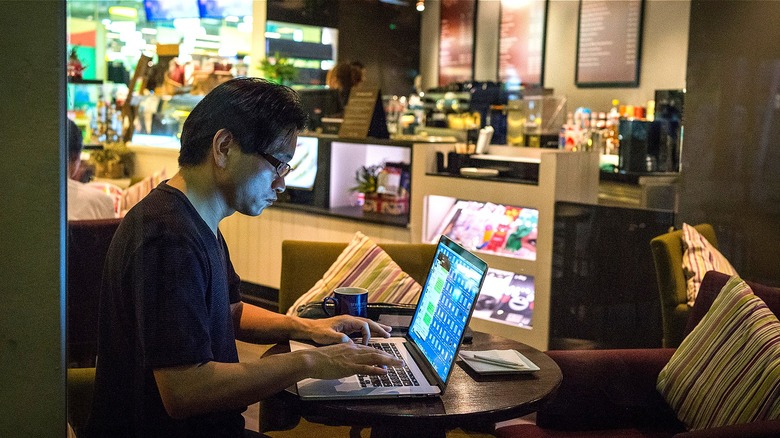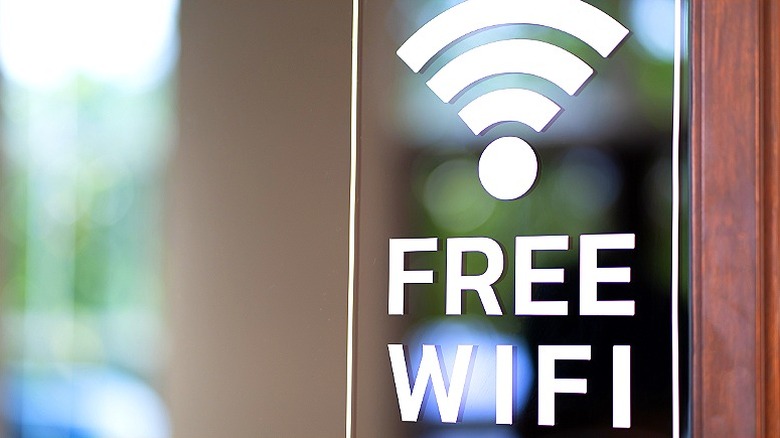You've Been Warned: Using Public Wi-Fi Could Put Your Finances In Jeopardy
For many people, logging onto public Wi-Fi isn't typically something they think twice about. After all, it's an extremely convenient thing to take advantage of, whether one is looking to get some work done at the local cafe or keep up with their texts, calls, or emails while in a hotel room with limited reception.
However, there's a reason why only 23% of respondents to a survey by Forbes Advisor said they believed public Wi-Fi to be completely safe. Just as hotspots can be convenient, they can also be extremely risky if you're not careful about your online activity when using them. Almost half of the survey respondents shared that, at some point, their online security was compromised while they were connected to public Wi- Fi.
Unlike private home connections, public Wi-Fi often doesn't have any protections in place for users, leaving them vulnerable to hackers that, through various methods, can snag a front-row seat to every virtual move you make. This may include logging in to an online banking platform (nearly 40% more Americans prefer this banking method to visiting a branch today) or inputting credit card details to make a purchase. In this article, we take a look at why public Wi-Fi is a breeding ground for cyberattacks and ways to keep yourself, along with your personal financial information, safe.
Why using public Wi-Fi comes with risks
While some smaller businesses require a password to access the Wi-Fi, many public spaces don't, leaving their networks — and their customers — vulnerable to those with malicious intent. Hackers have become technologically savvy over the years, with numerous crafty schemes in their toolbox to steal vital information from unwitting public Wi-Fi users.
One of these tactics includes a man-in-the-middle attack, which allows the hacker to spy on and control online communications between two parties. Another is malware distribution; this involves the hacker installing spyware, ransomware, or other malicious programming after they determine weak spots in your software. Then there's packet sniffing, which sees hackers using software kits to view every detail of your online activity, including a full view of personal financial information, sensitive documents, and more.
Becoming a victim to such attacks can happen anywhere, but hackers tend to target public Wi-Fi available at airports, hotels, and restaurants/cafes the most. In its survey, Forbes Advisor found that, of the respondents who had their online security breached while using public Wi-Fi, 23% of them had it happen at an airport, 20% at a hotel, and 25% at a restaurant; compare this to the 12% at a retail store and 9% at a school.
How to stay safe while using public Wi-Fi
Sometimes, people have no choice but to log onto public Wi-Fi, especially at high-risk spots like airports, hotels, and cafes and coffee shops, where cell service can be spotty. The good news is, there are ways to protect against the hackers lurking on the network.
First and foremost, it's recommended that you refrain from any online activity that involves inputting and accessing personal information while using public Wi-Fi. This includes logging in to online banking, making a purchase that involves typing in your credit card number, or anything else that would allow hackers to easily see sensitive details, like your Social Security number, on the screen. Instead, keep your activity limited to watching YouTube videos, playing games, and other mundane things that hackers have no interest in.
It's also recommended that public Wi-Fi users take advantage of a VPN (virtual private network), which adds a layer of security and makes it harder for hackers to get in. Still, even if you use a VPN, accessing sensitive information isn't advised, as even these private networks aren't foolproof. (And on a related note, here's how to try and get your money back if you've been scammed.)


